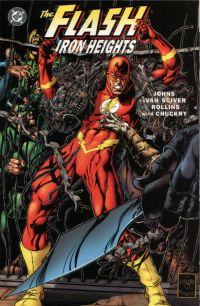One of the strangest things to hit comics fandom last week was the furor over DC EIC Dan Didio’s rumored ouster. It didn’t happen — in fact, his contract was renewed — but in response, Collected Editions has posted a list of 3 things Didio has done right for DC:
- Revitalized the summer event crossover.
- Greater continuity in publishing (ex: Countdown, Full Throttle, and The Lightning Saga all fitting together).
- Emphasis on a good story (including support for low-selling, but critically-appreciated books).
#1 is a matter of perspective: if you like big events, it’s a good thing. If you don’t, it’s not. Personally, I’m getting tired of them.
#2 is a bit of an odd choice for a wait-to-trader, since you don’t get the impact of, say, Bart’s death and Wally’s return hitting simultaneously if you’re reading the trades months later. Though I suppose it’s sort of like looking at the way the various pieces of Seven Soldiers interlock.
#3 I absolutely agree with. I’ve lost a number of favorite books to low sales in the past, and while I haven’t gotten into, say, Manhunter or Blue Beetle, it’s nice to see some of these books given more of a chance.
My Frustrations
That said, I’ve found myself very frustrated with DC over the last few years, for the following reasons:
1. As mentioned above, I’m tired of mega-crossovers. I was actually prepared to skip Final Crisis until I found out it was being written by Grant Morrison. (Of course, it’s since become clear that I would have had to pick it up anyway for research material!) Edit: This is, of course, not unique to DC. Marvel is just as focused on big events. It occurs to me that my current favorite series are Fallen Angel (IDW), Dynamo 5 (Image), Fables (DC/Vertigo) and Girl Genius (Studio Foglio) — all of which are stand-alone series. Of those, only D5 even takes place in a shared universe.
2. Mishandling of the Flash after Geoff Johns left. Six creative changes in three years. Two relaunches, and possibly a third coming up. A high-profile launch with writers who hadn’t adjusted to the medium. Starting both relaunches with slow burns instead of hitting the ground running.
There was no need to relaunch the book after Infinite Crisis. DC just figured “You can’t have a Crisis without a dead Flash” (or whatever the quote was). On the relaunch, Bilson & DeMeo were learning rapidly, but not fast enough to turn around sales. Marc Guggenheim was brought in to kill Bart, and response to his story made it clear that DC didn’t need to replace him. I’m very much enjoying Tom Peyer’s arc on the book, but just as it got going, DC announced a new creative team. It feels like DC has no idea what to do with the character, and is flailing around in a panic, grasping at everything without actually taking hold of anything long enough to let it build.
Since Flash is the only ongoing DCU book I read regularly these days, that makes a big difference. I can only hope that the attention the Flash is getting through Final Crisis and Rogues’ Revenge will turn things around.
3. The wholesale slaughter of “redundant” and C-list characters to make a point. That’s just throwing away long-term story potential for short-term shock value. Yes, you can bring them back, but every time you do, it makes the threat of death that much less credible for the next story. And no, this didn’t start in the last few years — I’ve seen more than a few favorites killed off within months of their series being canceled back in the 1990s — but it seems to have accelerated drastically from Infinite Crisis onward.
I can’t say how much of this is Didio’s fault, however, which is part of why I stayed out of the discussion last week. That, and it had turned into a virtual lynch mob. It was downright eerie watching the same thing happen, focused on the recent Flash editor, Joan Hilty, over at Comic Bloc — yes, Comic Bloc, the place that Newsarama posters think is full of rainbows and ponies enforced by a fascist dictatorship of moderators. I’d like to refer readers to this xkcd comic strip. Or, if you’re okay with swearing, Penny Arcade’s Greater Internet ——wad Theory (NSFW language) sums it up succinctly.

 There have been rumors of a Geoff Johns/Ethan van Sciver project for months, and speculation that it might be a Flash series starring
There have been rumors of a Geoff Johns/Ethan van Sciver project for months, and speculation that it might be a Flash series starring